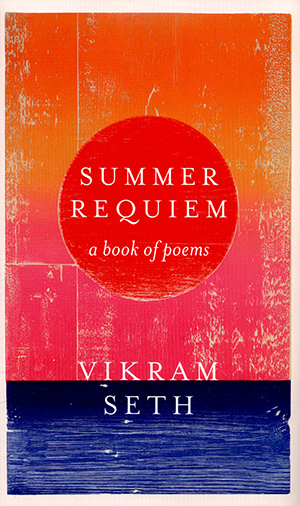Summer Requiem by Vikram Seth
 London. Weidenfeld & Nicolson. 2015. 66 pages.
London. Weidenfeld & Nicolson. 2015. 66 pages.
“My hands dissolve in water. / My body wastes away. / The air drifts past and through me / Each night and every day. // Bright darkness is my comfort, / Dark daylight is my friend, / And even I can’t reckon / Where I subsist or end.” This poem, “Bright Darkness,” adorns the back jacket of Vikram Seth’s new slim volume of poetry, Summer Requiem. The oxymoronic irony of phrases like “bright darkness” and “dark daylight” set a melancholic tone that underlies much of the book.
In Summer Requiem, Seth pays homage to his mentor poets—Wang Wei and Pushkin, part of the subject or inspiration of Three Chinese Poets and The Golden Gate, respectively. Among my favorites in the book include translations he has done of Giacomo Leopardi. His poem “The Infinite” ends hauntingly: “it is / Sweet to me to be shipwrecked in this sea.” Seth’s ten-syllable iambic-pentameter translations lend a contemporary tone.
In a cleverly constructed single poem, “Haiku,” many individual stanzas can work as freestanding haiku with its 5-7-5 syllabic-count tercets, while the agglomeration of fourteen haiku that form the whole poem paints Seth’s sleeplessness on a Delhi winter night: “a mosquito’s here — / out of season, out of tune, / homing in on blood.”
Politics is an area Seth deals with in an oblique manner. In the poem “The Halfway Line,” each scorpion stretched “his claws towards the halfway line / Marked on the broken glass, and retched / Out venom from an absent spine.” Telling comments on politicians and political parties who would do anything, using fair means or foul, to reach the halfway line required to secure a parliamentary majority.
Seth commented at the recent Summer Requiem book launch in Delhi that “writers as writers and writers as citizens—they are both seamless.” This remark takes on an added resonance in the current Indian political climate where many writers have returned their national awards in protest against both the country’s leading so-called autonomous literary organization and the ruling party for having stayed mute vis-à-vis recent killings and atrocities against fellow writers, against the basic principle of free speech.
Finally, Seth returns to a familiar personal theme of love gained and love lost. In the poem “Caged,” we see grief in a relationship that has lost its spark in spite of the fact that love is still present. He asks, “Why could this not wait till our love could die?” In that current state, the relationship ambles along as a “Poor, pointless relic bent on staggering on / When courtesy and passion both have gone.”
Summer Requiem, written over the last twenty years, is a quiet and meditative book much like his earlier one, All You Who Sleep Tonight. In this volume, the motif of the incarnadine—including the ruddy summer sunset image on the cover—recurs: “Rose light enflamed the eastern sky” (“One Morning”), the pink of the “Acroclinium” flower, and “The hour of rust brings everything to a close” (“Summer Requiem”).
There is sadness and weariness too—“My love has gone. What do I have instead?” or “My joints have rusted and my brain is lead” (“Can’t”). It is a mature and older Vikram Seth—a writer who has lived, traversed, and experienced a long and varied life with its sine-graph vicissitudes.
Sudeep Sen
New Delhi, India







































